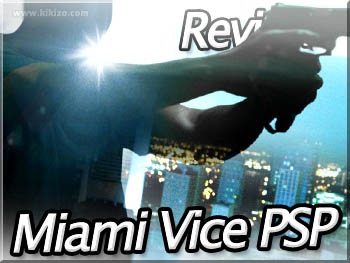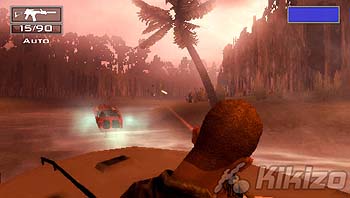Miami Vice The Game
The games biz has changed since the 80s, right?
| Version PSP | Developer Sierra | Publisher Vivendi | Genre Action |
||||
Ah, the 80s. If you're old enough to remember them, they were a notorious time for licensed games. The videogame industry was just finding its feet and amidst all the teething troubles and growing pains, dodgy Hollywood tie-ins were abound. There was the occasional jewel in the crown, but for every Robocop, there were a dozen E.T.'s. Well, maybe there can only be one E.T. but there were many titles approaching the same sub-standard. Thankfully, the gaming industry has moved on since then, hasn't it?

As if to deliver a resounding no, Vivendi has released the Rebellion developed Miami Vice The Game, conveniently titled for those of us mistakenly picking up our PSP's and wondering why it doesn't look and sound like the movie trailer that has been running on our TVs. And, in a move portraying the highest levels of irony, since the game of the movie of the TV show is set in the 80s, Rebellion has also decided to utilize an 80s development ethos and cash-in by rushing to produce a below average game which one can only assume is a re-hash of their previous PSP games but with license specific alterations.
With PS1 visuals and gameplay from a bygone era, Miami Vice opens with its most exciting piece of non-linearity - the option play as either Sonny Crockett or Ricardo Tubbs. From there on the player must infiltrate the seedy underworld of drug barons and gang lords in order to bring down a South American cartel boss but regrettable the action only goes one-way - downhill and with no stops. Most levels open with a short animated intro to set the scene and then it's simply a case of making your way from point A to point B, shooting the bad guys along the way, or alternatively running past them to the next room, occasionally stopping to pick up the obligatory health pack, ammo, or drugs.
Such is the lack of creativity that to describe one level is to describe them all. Typically the player has two main goals on each level, for instance to destroy the meth labs and then reach the exit. The location of these targets are indicated on the in-game map. In addition to this there are further sub-tasks on each level - sub-tasks that remain the same across each level and involve shutting down the CCTV cameras, obtaining the FlashRAM (which can later be hacked at the Police Station) and collecting all the narcotics.
The collected narcotics can be traded with other disreputable characters outside the main levels, such as drug dealers and barons which then increases your cash. Trading drugs with Freddie Luiz before each level will enable you to see the location of these miscellaneous objectives on the map, as well as all the enemies and the first aid boxes. For a paltry few units per piece of infomation, the benefit to the player is evident but quite what Freddie gets out of the deal is not so clear.
As if to attempt to break from the monotony, every so often the game will present you with a speedboat level whereby the player must race from one end to the other. Again though the levels are stunningly linear and with infinite ammo, auto lock-on and auto-reload are also pointless in terms of challenge.
The enemy AI also seems to have been taken from the 80s as henchmen run from cover to the open, fire off a few rounds in your direction and then run back to take cover. The only difficulty comes from finding the exact position of your enemies and in finding a position whereby you can pick off your targets one by one whilst remaining relatively concealed. With the ability to crouch and sneak, hide behind objects and peer around corners, one would think that stealth would play a bigger part of the game. However, whilst knocking over speakers or statues to use as cover does not seem to alert enemies to your presence, taking one step in their direction or peeking around a corner will do. From there on the player is subject to a torrent of repetitive and grating taunts - a grand total of 3 or 4 played over and over. Obviously the 80s was a time devoid of originality and imagination.
Any cash that has been accumulated via trading with drug dealers can be used to buy limited weapon upgrades and clothing. These have an impact on your reputation bonus given out at the end of each level. Certain clothing (i.e. Sonny's white suit) will boost your rep more than others but provides little in the way of armour protection. Similarly you can upgrade your weapons as well as purchase new ones to select from prior to starting each level.
Finding the FlashRAM on each level enables you to hack it back at the Police Station, the success of which opens up the location of drug barons and certain upgrades. The actual process of hacking is non-sensical in terms of the license but it is symptomatic of the game as a whole that thanks to its play mechanics and hypnotic visuals, this is one of its more interesting parts. Taking inspiration from titles like Geometry Wars, the player pilots a small craft with the aim of charging up its weapon and releasing it in the vicinity of various spinning cubes, destroying them and then collecting the orbs left behind. Once a certain number have been collected, it's on to the next phase and after 3 phases the hack is complete.
There are many other numerous faults with the game too indicating an overall lack of polish and care - the in-game map does not accurately portray height on levels which take place across multiple floors; the music whilst bearable plays on a loop which does not entirely match up at its ends; the fact that you can't run and shoot at the same time, or that you have to hold down the reload button all the way through the process - releasing too early means that the reload is cancelled.
Whilst it might be a detriment to other games, perhaps Miami Vice's one saving grace is its relatively short playing time - like the 80s, it's all over with before you know it.
| ||||||||||||
|



















 Satoru Iwata Video Interview - the late Nintendo president spoke with Kikizo in 2004 as 'Nintendo Revolution' loomed.
Satoru Iwata Video Interview - the late Nintendo president spoke with Kikizo in 2004 as 'Nintendo Revolution' loomed. Kaz Hirai Video Interview - the first of Kikizo's interviews with the man who went on to become global head of Sony.
Kaz Hirai Video Interview - the first of Kikizo's interviews with the man who went on to become global head of Sony. Ed Fries Video Interview - one of Xbox's founders discusses an epic journey from Excel to Xbox.
Ed Fries Video Interview - one of Xbox's founders discusses an epic journey from Excel to Xbox. Yu Suzuki, the Kikizo Interview - we spend time with one of gaming's most revered creators.
Yu Suzuki, the Kikizo Interview - we spend time with one of gaming's most revered creators. Tetris - The Making of an Icon: Alexey Pajitnov and Henk Rogers reveal the fascinating story behind Tetris
Tetris - The Making of an Icon: Alexey Pajitnov and Henk Rogers reveal the fascinating story behind Tetris Rare founders, Chris and Tim Stamper - their only interview? Genuinely 'rare' sit down with founders of the legendary studio.
Rare founders, Chris and Tim Stamper - their only interview? Genuinely 'rare' sit down with founders of the legendary studio. The History of First-Person Shooters - a retrospective, from Maze War to Modern Warfare
The History of First-Person Shooters - a retrospective, from Maze War to Modern Warfare